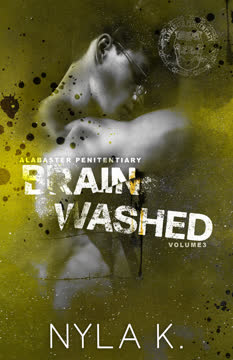Plot Summary
Monster in the Spotlight
The world knows him as The Carver, a monster who kills without remorse, now locked away in the notorious Alabaster Penitentiary. Felix's notoriety makes him both a target and a celebrity among inmates and guards. He's isolated, studied, and treated as a specimen, not a person. Yet, beneath the bravado, Felix is haunted by loneliness and a desperate need for connection. His story is not just about violence, but about the hunger to be seen, to matter, and to understand the darkness within himself. The prison becomes a stage for his mind games, and the arrival of a new doctor promises to change everything.
The Doctor Arrives
Lem is a renowned psychiatrist, fascinated by the criminal mind, and handpicked to study Felix. He's methodical, emotionally reserved, and carries his own scars—both literal and psychological. Lem's arrival is met with suspicion and resistance from the staff, but he's undeterred. He's not here to cure Felix, but to understand him, to peel back the layers of monstrosity and find the human beneath. Their first encounters are tense, filled with silence and mutual observation, each man sizing up the other, both aware that something profound is about to unfold.
Childhood Shadows
Growing up invisible in a dysfunctional family, Felix is shaped by neglect, a cold father, and a mother's instability. His fascination with death and anatomy begins early, dissecting animals and craving his father's approval. The seeds of his sociopathy are sown in these formative years, as he learns to mask his true self and survive by being unseen. The trauma and isolation of his youth become the foundation for the monster he will become, and the lines between curiosity and cruelty blur.
The Carver's First Kill
As a young adult in New York, Felix's need for connection collides with his compulsion to kill. His first victim, Emmanuel, is both lover and prey—a man Felix wants to keep forever. The act of murder is intimate, almost loving, but also brutal and final. Felix's inability to feel remorse is clear, but so is his longing for affection. Each kill becomes a twisted attempt to fill the void inside him, to possess what he cannot have. The Carver is born, and with him, a cycle of love and violence that will define his life.
Prison Games
Felix navigates the dangers of prison politics, the threat of other inmates, and the manipulations of the guards. His reputation precedes him, making him both feared and envied. The arrival of a cellmate, the constant surveillance, and the unpredictability of daily life keep him on edge. Yet, even here, Felix seeks connection—through games, through violence, through the walls that separate him from others. The prison becomes a microcosm of his inner world: dangerous, lonely, and full of hidden desires.
The Mind's Mirror
Their sessions are a battle of wits, each probing the other's weaknesses and secrets. Lem is both fascinated and repelled by Felix, drawn to his intelligence and honesty about his crimes. Felix, in turn, is intrigued by Lem's calm authority and the darkness he senses beneath the surface. Their conversations blur the lines between doctor and patient, predator and prey. Both men are searching for something—understanding, redemption, or perhaps just a reflection of themselves in the other.
Experiments and Obsession
Subjected to psychological and physical tests by the prison's doctors, Felix is treated as less than human. Electroshock therapy, drug-induced confessions, and sexual humiliation become routine. Lem is both complicit and protective, torn between his role as researcher and his growing attachment to Felix. The experiments reveal not just Felix's pathology, but also Lem's own obsessions and vulnerabilities. The boundaries between science and sadism, care and control, begin to dissolve.
The Wall Between Us
Locked in solitary, Felix forms a bond with Dash, a fellow inmate he can only speak to through the wall. Their conversations are a rare source of comfort and humanity, reminding Felix of what he's lost and what he still craves. The wall becomes a symbol of all the barriers—emotional, physical, moral—that define Felix's existence. When Dash escapes, Felix is left more alone than ever, but also changed by the brief taste of genuine connection.
Love and Violence
What begins as clinical curiosity becomes mutual obsession. Their encounters are charged with danger, desire, and the ever-present threat of betrayal. Sex and violence intermingle, each man testing the limits of the other's control. Lem is forced to confront his own darkness, his capacity for both care and cruelty. Felix, for the first time, experiences something like love—not as possession, but as surrender. Their bond is as destructive as it is redemptive, a union of two damaged souls.
The Doctor's Confession
Haunted by childhood abuse and family secrets, Lem is not the savior he appears to be. His fascination with killers is rooted in his own pain, his need to understand and master the forces that once controlled him. Sharing his story with Felix, Lem exposes his vulnerability, and the power dynamic between them shifts. They are no longer just doctor and patient, but equals—each carrying wounds that the other can both heal and exploit.
Betrayal and Survival
When Lem is forced to leave the island, Felix is left at the mercy of the sadistic doctors. Torture, rape, and humiliation push him to the edge of despair. The betrayal cuts deeper than any physical wound, and Felix's will to live falters. Yet, even in the darkest moments, the hope of Lem's return keeps him alive. Survival becomes an act of defiance, a refusal to let the world erase him completely.
Blood and Belonging
Lem returns, rescuing Felix and exacting brutal revenge on those who hurt him. Together, they reclaim power over their tormentors, turning the tools of the prison against its masters. Their love is forged in blood and pain, a testament to their resilience and their refusal to be defined by their pasts. The violence that once separated them now binds them together, and they find belonging in each other's arms.
The Return
With the old regime toppled, Lem and Felix carve out a space for themselves within the chaos. Allies are made, enemies are dispatched, and the rules of the prison are rewritten. Their relationship, once forbidden and dangerous, becomes a source of strength and stability. Yet, the threat of the outside world—and the darkness within—remains ever-present. They must navigate shifting loyalties, new inmates, and the ever-watchful eye of The Ivory.
The Monster's Heart
For the first time, he allows himself to believe that he is worthy of affection, that even a monster can be loved. Lem's acceptance is both a balm and a challenge, forcing Felix to reckon with the consequences of his actions and the reality of his nature. Their love is not a cure, but a choice—a daily act of faith in each other and in the possibility of something better.
Brainwashed Together
Lem and Felix are bound not just by passion, but by a mutual brainwashing—a surrender to each other's influence. Their relationship is a closed circuit, feeding on itself, dangerous and intoxicating. They find freedom in their captivity, joy in their shared darkness. The world outside fades away, and the prison becomes their sanctuary, a place where they can be fully themselves, for better or worse.
The New Order
With new inmates arriving and old enemies lurking, Lem and Felix must navigate a landscape of shifting power. Friendships are forged, betrayals are revealed, and the line between guard and prisoner blurs. The community they build is fragile, held together by trust, fear, and the ever-present threat of violence. Yet, within this chaos, they find moments of peace, laughter, and even hope.
Love in Chains
Their love is not an escape from their pasts, but a way of surviving it. They create rituals of comfort—shared meals, music, walks in the woods—that anchor them in the present. The prison is still a cage, but it is also a home, a place where they can be together. Their relationship is a testament to the power of connection, even in the most unlikely and unforgiving circumstances.
Forever in the Dark
Felix and Lem, monsters and men, find solace in each other's arms. Their future is uncertain, their pasts unforgivable, but together they carve out a space for themselves in the darkness. The world may never understand them, but they understand each other. In the end, that is enough. Their love is both a curse and a blessing, a brainwashing that sets them free.
Characters
Felix Darcey
Felix is the infamous Carver, a serial killer whose crimes are both intimate and brutal. Raised in neglect and emotional isolation, he develops a fascination with death and anatomy, seeking control and affection through violence. Felix is self-aware, honest about his lack of remorse, but deeply insecure and hungry for love. His relationships are marked by obsession and possession, yet with Lem, he discovers a new kind of vulnerability. Felix's journey is one of survival, self-acceptance, and the search for meaning in a world that sees him only as a monster.
Dr. Lemuel Love
Lem is a renowned psychiatrist, drawn to the minds of killers by his own childhood trauma. Scarred by abuse and family secrets, he seeks understanding and mastery over the forces that once controlled him. Lem's fascination with Felix is both professional and personal, and as their relationship deepens, he is forced to confront his own capacity for violence and obsession. Lem is both caretaker and manipulator, protector and predator, and his love for Felix is as dangerous as it is redemptive. His journey is one of self-discovery, healing, and the acceptance of his own monstrousness.
Manuel Blanco (The Ivory)
The Warden of Alabaster Penitentiary, Manuel is a master manipulator who collects monsters and wields power with a velvet glove. He is both ally and adversary to Lem and Felix, playing his own game of survival and dominance. Manuel's motivations are opaque, his loyalties shifting, but his need for control is absolute. He represents the institutional cruelty of the prison, but also the possibility of change—if only for his own benefit.
Dr. Templeton
One of the East Wing's doctors, Templeton is fascinated by pain and control, using his position to torment and violate inmates. His rivalry with Lem is both professional and personal, and his abuse of Felix is a turning point in the story. Templeton's downfall is a testament to the dangers of unchecked power and the resilience of those he seeks to break.
Joy Jameson
The only female guard on the island, Joy is a survivor in a world of predators. She navigates the prison's politics with wit and strength, forming unlikely alliances with both inmates and staff. Joy's relationship with Felix is complex—part adversary, part protector—and her presence is a stabilizing force amid the chaos.
Officer Chevelle (Velle)
The head of security, Velle is both enforcer and victim of the prison's brutality. His relationship with Lem and Felix evolves from hostility to uneasy alliance, as he recognizes the need for change. Velle's journey is one of self-discovery, loyalty, and the struggle to maintain order in a world built on chaos.
Dash
A fellow inmate who befriends Felix through the wall, Dash represents the possibility of connection and freedom. His escape is both a loss and an inspiration for Felix, reminding him of what is possible even in the darkest circumstances.
Trevel Fenwick
A former patient of Lem's, Trevel is a killer shaped by trauma and abuse. His arrival at Alabaster Penitentiary is both a threat and a challenge, forcing Lem to confront the limits of his own influence and the consequences of his choices.
Dr. Johansson
The head of the East Wing's experiments, Johansson is a true believer in the power of science to reshape the mind. His indifference to suffering and his willingness to cross ethical lines make him both a formidable adversary and a cautionary figure.
Want (the mannequin)
Want is Felix's imaginary friend and the embodiment of his desire for connection. The mannequin is both a comfort and a curse, representing the line between fantasy and reality, possession and love. Want's presence in Felix's life is a reminder of the loneliness that drives him—and the hope that, one day, someone real will take Want's place.
Plot Devices
Dual Narration and Psychological Intimacy
This dual narration blurs the line between subject and observer, allowing the reader to experience the push and pull of their relationship from both sides. The intimacy of their inner worlds is heightened by confessional monologues, therapy sessions, and the gradual revelation of secrets. The narrative structure mirrors the process of psychological examination, with each chapter peeling back another layer of defense, denial, or desire.
Prison as Microcosm and Metaphor
The prison's physical isolation, its labyrinthine corridors, and its culture of surveillance and violence reflect the characters' internal states. The walls that separate Felix from others are both barriers and mirrors, forcing him to confront his own reflection. The prison's shifting power dynamics, experiments, and alliances serve as a backdrop for the characters' emotional journeys, making the setting an active participant in the story.
Violence as Communication and Connection
For Felix, murder is a way of possessing and preserving what he cannot otherwise hold. For Lem, violence is both a source of fascination and a means of reclaiming agency. Their relationship is marked by a constant negotiation of boundaries—between care and control, pleasure and pain, love and destruction. The story uses violence not just for shock, but as a language through which the characters seek understanding and belonging.
Foreshadowing and Repetition
The repetition of certain phrases, songs, and images creates a sense of inevitability, as if the characters are trapped in cycles they cannot escape. Dreams and fantasies bleed into reality, blurring the distinction between what is imagined and what is lived. The use of foreshadowing heightens the tension and underscores the story's central themes of fate, choice, and the possibility of change.
Subversion of Redemption and Romance
Felix is not "cured" by love, nor is Lem redeemed by his relationship with a killer. Instead, their bond is presented as a form of mutual brainwashing—a surrender to each other's influence that is both liberating and dangerous. The romance is not an escape from darkness, but a way of surviving it together. The story refuses easy answers, embracing the complexity and ambiguity of its characters' desires.
Analysis
Nyla K. subverts the conventions of both the romance and psychological thriller genres, refusing to offer easy redemption or simple moral lessons. Instead, the novel immerses readers in the minds of two deeply damaged men—one a killer, the other a healer—whose relationship is as destructive as it is redemptive. The story interrogates the boundaries between love and obsession, care and control, science and sadism. It asks whether monsters are born or made, and whether even the most broken among us can find belonging. The prison setting becomes a metaphor for the cages we build around ourselves, and the violence that permeates the narrative is both a symptom and a language of longing. Ultimately, Brainwashed suggests that healing is not about erasing the past, but about finding someone who can hold your darkness with you. It is a story about survival, not salvation; about the power of connection to both destroy and save us. In a world that fears and isolates its monsters, the novel dares to imagine what might happen if, instead, we tried to understand them—and, in doing so, understand ourselves.
Last updated:
Review Summary
Brainwashed is a dark, twisted romance between a serial killer and his psychiatrist. Readers praise its complex characters, gripping plot, and intense sexual content. Many found the relationship between Felix and Dr. Love compelling, despite its taboo nature. Some readers appreciated the true crime elements and psychological insights. However, a few felt conflicted about rooting for a serial killer protagonist. While most reviewers gave high ratings, some found certain scenes disturbing or too graphic. Overall, the book is described as addictive and thought-provoking.
Alabaster Penitentiary Series
Download PDF
Download EPUB
.epub digital book format is ideal for reading ebooks on phones, tablets, and e-readers.







